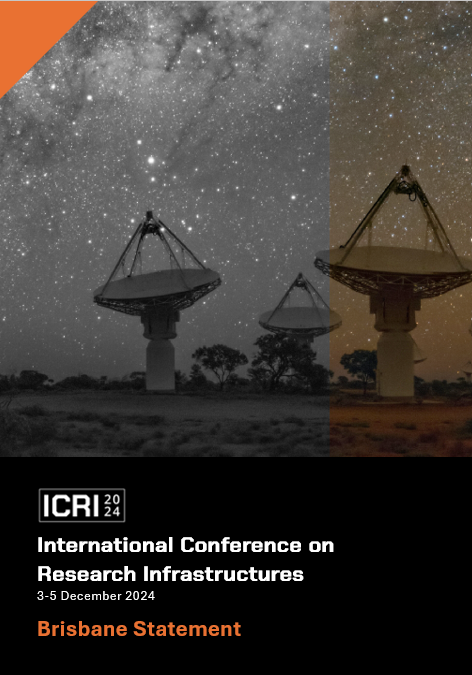The Brisbane Statement
Introduction
Research Infrastructures (RIs) constitute major strategic assets across all scientific disciplines, research fields and national, regional, and global scales. They support the research needed to produce breakthrough discoveries and address societal challenges.
For international cooperation and collaboration among RIs, it is necessary to develop and implement governance and funding models that build trust, manage risk and enable infrastructures to keep up with technological developments. Policymakers and funders play a critical role in the evolution of RI to harness it for new opportunities and different applications.
The Brisbane Statement arises from the 2024 International Conference on Research Infrastructures (ICRI 2024). It encourages all RI stakeholders to actively consider the role of RIs in addressing global challenges, and how strengthening international RI collaborations can help solve them.

Addressing Global Challenges
RIs underpin the research needed to address global challenges such as climate change, natural disasters, food security, pandemic preparedness, and improving human health. New digital technologies such as AI and big data can increase the impact of RIs addressing these challenges.
Addressing global challenges requires global collaboration, as different nations and regions bring both knowledge and data from their region, and diverse perspectives on possible solutions. When addressing these challenges, all nations have a unique role in the RI system, and there is a need for higher-income economies to support and engage on an equitable basis with the research communities in lower- and middle-income economies.
It is essential that RI managers, policymakers and other RI decision-makers have a clear long-term vision and enough flexibility to respond to urgent priorities and emerging opportunities.
Climate Change and the Energy Transition
RIs are a critical component of land, ocean and space observation systems, providing data that improves understanding of the global climate system and informs climate change mitigation and adaptation efforts. Social science and humanities RIs deliver critical information both on the causes of environment and climate change and societal responses to adaptation and mitigation policies.
RIs will enable research into the materials and processes necessary to advance new energy sources and cost-effective low-carbon technologies. RIs themselves are also working to become more environmentally sustainable through more efficient energy and material consumption, and other actions.
Healthy Communities
RIs play a vital role in supporting better human health and wellbeing in areas such as pandemic preparedness, emerging diseases and malnutrition. They underpin research across a range of fields such as drug and vaccine discovery, human exposomics, epidemiology and biosecurity. RIs play a critical role in supporting research on the societal determinants of health and behavioural responses to health policies.
Technological advances such as the use of AI for medical imaging, high-performance computing to enable drug discovery, and advances in biobanking, increase the potential of international collaboration in RIs for health. These advances are supported by increasingly skilled technicians who enable the best use of new technologies. RIs also enable research projects that increasingly seek to integrate multiple disciplines and communities to explore the relationships between human health, animal health and environmental change.
RIs will need to build on existing multidisciplinary and international collaborations to continue to support improved global health outcomes, and be supported by policy to adapt to shifts in health research caused by changes in technology, global issues and societal expectations.
Feeding the Planet
Understanding how the Earth’s biodiversity and climate impacts future agricultural systems relies on RIs. They preserve seed samples, provide data for interdisciplinary projects, and characterise critical crops that have the potential for climate change adaptation. As a result, groundbreaking biotechnological advances and techniques, and social models for food sustainability, are unlocked through RIs.
RIs underpin global collaborative research efforts to ensure world-wide food security by working to overcome environmental challenges such as constrained soil and water resources, and threats from pathogens, pests and invasive species. Policymakers rely on researchers to discover not only the physical solutions to these challenges, but to build the social licence needed for citizens to embrace them. RI are excellent hubs for engaging with local communities and bring society closer to scientific developments.
Ongoing support for RI capability is needed for these research efforts to continue to chart a global path toward future food sustainability.
RI for Translational Research
RI services hold great potential to accelerate the conversion of scientific knowledge into new applications and products. They can also help improve the sustainability of industrial production processes. In order to make the most of this potential, bridging the gap between academia and the public and private sectors is key. Converting research into practical applications brings innovation to critical areas, such as health, climate adaptation, manufacturing, construction and energy.
RI services can support the translation of research by considering this in their strategies and operational models, and working with researchers to ensure RI usage meets necessary regulatory requirements so their research can be used in commercial or societal contexts. In doing so, RIs can attract diverse users and funding, and maximise the impact of new knowledge across society.
Digital Research Infrastructure
Coordinated approaches to Digital Research Infrastructure (DRI), such as national digital research infrastructure strategies, are becoming increasingly important to national and global research and innovation efforts. These approaches enable RIs to manage increasing data volumes (including storage and curation), develop digital research skills, and provide cohesive access across different DRI resources and platforms to users. They also allow RIs to apply consistent data management and sharing protocols to make data more internationally interoperable. DRI needs to be more sophisticated and span across multiple domains and scales so that researchers can share, access, and analyse increasingly larger and more complex data.
Open science strategies depend on well-connected DRI to manage science and research data. RI data policies and governance should enable adherence to FAIR (Findable, Accessible, Interoperable and Reusable) data principles, and promote trust and identity verification, cybersecurity, quality assurance mechanisms, and appropriate access mechanisms for sensitive data.
Indigenous Knowledge Systems
Indigenous Knowledge systems (sometimes also referred to as Indigenous and local knowledge systems) are deeply rooted in connection to cultural identity, language and traditional kinship systems. These systems bring constantly evolving knowledge, values, understandings and beliefs into decision-making at different scales for the well-being of people and the planet.
RIs can play an important role in supporting and valorising Indigenous Knowledge systems. By incorporating a rights-based, people/purpose focused framework like the CARE Principles (Collective benefits, Authority to control, Responsibility, and Ethics), RIs can effectively enable Indigenous Data Sovereignty and support the rights of Indigenous Peoples to Indigenous Knowledge within the research ecosystem. The incorporation of the CARE principles is critical for RIs to effectively host or support the generation of Indigenous Data, such as in genomic sequencing, the collation of Indigenous environmental knowledge, and characterisation of cultural artefacts.
Culturally aware RIs can also actively support collaborative engagements with local Indigenous Knowledge custodians and work within Indigenous Knowledge systems in a manner that best supports each respective engagement. Where physical RIs are built on the lands of Indigenous Peoples, land use agreements for these sites should ensure that local cultural heritage is protected, and provide benefits such as community development, infrastructure, training and education.
By developing partnerships and co-designing policy with Indigenous communities from their inception, RIs can improve social buy-in, maximise positive impacts in local communities, and valorise Indigenous Knowledge systems.
Frontiers of Knowledge
The boundaries of what science can achieve are constantly expanding, and to explore them the research sector depends on the advancement of RIs.
RIs are essential in exploring and understanding our universe, from sub-atomic structures to space observation; basic chemistry to the complexity of the brain; simple ecosystems to the global earth; and from individual to population behaviours. Some of the equipment or networks of instruments required for this exploration are of such a scale, cost and level of complexity that their construction and operation require international collaboration, drawing on facilities and expertise from different parts of the world. This need for international collaboration will only increase as RI – and the research that can be achieved with it – becomes increasingly sophisticated.
To push the frontiers of knowledge and conquer some of the big questions in science, the RI staff of the future, such as facility managers and expert technicians, will need to be trained in the increasingly interdisciplinary crossroads between research and technology. These personnel provide expert advice to develop RI, support RI users and provide field-specific support. RI staff will also need to be supported with career pathways, recognition of their achievements, and positive employment and workplace conditions. RI workforce strategies will need to attract, retain and train the uniquely skilled personnel who manage, maintain and operate these facilities.
Long-term, collaborative, strategic planning for RIs is necessary to ensure that the critical research and exploration they enable continues in the decades to come.
Looking Forward
RIs are the foundation of global research excellence and underpin the research sector’s ability to adapt to new challenges and answer new scientific questions. RIs provide researchers with the tools and services to address emerging challenges, and empower advances in research by providing inclusive, collaborative and interdisciplinary networks for an increasingly wide range of users.
The incredible discoveries and achievements made possible by RIs demonstrate their importance and provide inspiration for the future, and the next generation of researchers. RIs require ongoing policy support and consistent funding to fully realise this potential.
RIs demonstrate the importance of long-term planning in the research system, and the value of funding models that allow RI leaders to proactively initiate collaborative ventures. The RI community is inherently international and collaborative, and the International Conference on Research Infrastructures provides the opportunity to celebrate and encourage these connections.
The Brisbane Statement calls on all RI stakeholders worldwide to support, invest in, and grow the collaborative global research infrastructure ecosystem. The world will continue to rely on RIs for addressing future challenges, both foreseen and unforeseen, and with strong global connections, research can continue to advance society to meet these challenges.
We acknowledge the Traditional Owners of the lands and waters throughout Australia, and pay respect to the Elders past, present and emerging. We recognise the importance of connection to culture, land, kinship and community to the health and wellbeing of Aboriginal & Torres Strait Islander families. We acknowledge the cultural practices and traditions still carried out today and being passed down to future generations.


